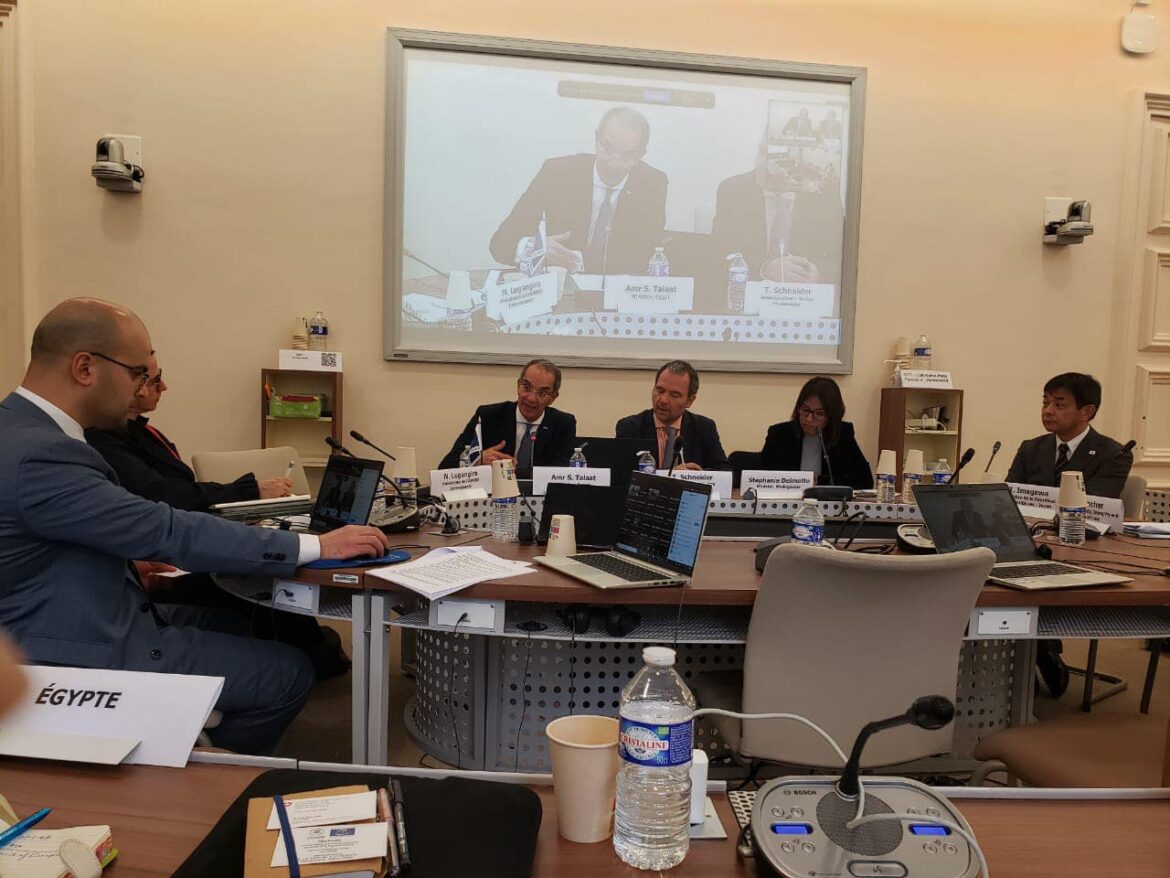The Minister of Communications and Information Technology Amr Talaat has participated in the closing ceremony of the Artificial Intelligence (AI) Action Summit on behalf of President Abdel Fattah El-Sisi.
The closing ceremony, opened by French President Emmanuel Macron in Paris, France, was attended by Indian Prime Minister Narendra Modi, Vice President of the United States (US) JD Vance, UN Secretary-General António Guterres, President of the European Commission Ursula von der Leyen, and Secretary-General of the International Telecommunication Union (ITU) Doreen Bogdan-Martin, along with nearly 30 heads of state and government, approximately 60 ministers, ambassadors, and government officials, in addition to 20 executives from international organizations.
As part of the summit, the ICT Minister took part in a workshop titled “African Engagement in Global AI,” organized by the Council of Europe (COE), which explored African countries’ perspectives on AI governance at the global level. The workshop featured the COE Secretary General Alain Berset and the Japanese Parliamentary Vice-Minister for Foreign Affairs Hisashi Matsumoto.
During the workshop, the ICT Minister outlined the Continental AI Strategy and the national and regional efforts to advance AI applications. He was joined by Madagascan Minister of Digital Development, Posts, and Telecommunications Stéphanie Delmotte, the Tanzanian Member of Parliament (MP) and the Chair of the African Parliamentary Network on Internet Governance (APNIG) Neema Lugangira, the Japanese Vice-Minister for International Affairs and Communications Takuo Imagawa, and the Expert, responsible for AI Policies and Governance, Computational Neuroscientist, former INRIA and Cornell Researcher Murielle Popa-Fabre. The workshop was moderated by the Swiss Vice-Chair of the COE Committee on Artificial Intelligence (CAI) Thomas Schneider.
In his remarks, Talaat emphasized Egypt’s remarkable progress in AI integration across different sectors, beginning with the establishment of the National AI Council in 2019, followed by the launch of the first edition of Egypt’s National AI Strategy, the creation of the Applied Innovation Center (AIC) to develop AI-driven solutions, and fostering partnerships with renowned universities and multinationals to implement development projects.
He also highlighted the launch of the Egyptian Charter for Responsible AI. He underscored that all these efforts propelled Egypt to 65th place globally in the Government AI Readiness Index, a remarkable rise from its 111th position in 2019.
The ICT Minister explained that the first edition of the National AI Strategy focused on four key pillars. These pillars include AI for Government (AI4G), aimed at automating government processes; AI for Development (AI4D), applying AI in different economic and developmental sectors; AI for Human Capacity Building (AI4H); and AI for International Activities (AI4X). He also referred to Egypt’s active engagement in international AI governance forums and its ongoing collaboration with ITU, UN agencies, and the Organisation for Economic Co-operation and Development (OECD).
In addition, the ICT Minister noted that Egypt chaired the African Union’s (AU) Working Group on AI, contributing to developing the AU Continental AI Strategy. Egypt also chaired the Arab AI Working Group, aiming to develop a common Arab strategy. He added that, with the two strategies now adopted, Egypt is collaborating with African and Arab partners to establish ethical frameworks and implement action plans.
Moreover, Talaat underscored the launch of the Second Edition of the National AI Strategy, which emphasizes Governance, Technology, Data, Talent, Ecosystem, and Infrastructure. He stressed ongoing efforts to establish a responsible AI center and develop a national AI regulatory framework.
Talaat stressed the pivotal role of AU and its state members in shaping the global AI governance landscape, underscoring Africa’s strong presence in this field through bilateral or multilateral collaborations. He also showcased the active involvement of African nations in drafting the UN-adopted resolution on enhancing international cooperation on the capacity-building of AI and their effective participation in global AI governance forums and dedicated working groups.
Additionally, the ICT Minister pointed to the AU Continental AI Strategy, officially adopted in July 2024, aiming to harness AI for achieving sustainable development goals (SDGs). He highlighted the necessity of developing regional AI policies that align with global frameworks while addressing Africa’s distinct priorities.
The ICT Minister presented several proposals to bolster Africa’s global influence, including developing a continental AI policy framework and strengthening regional AI governance bodies by establishing an African AI policy unit to coordinate AI strategies across African nations and ensure African representation in global AI forums. He underscored the critical role of encouraging public-private partnerships and setting up specialized research and training centers dedicated to AI policy. He also noted that efforts are underway to launch the African AI charter, envisioned as a cornerstone for crafting inclusive, community-driven AI policies that align with Africa’s needs and cultural heritage.
Furthermore, Talaat encouraged the international community to invest in AI research and innovation centers, cultivate local talents, enhance Africa’s digital infrastructure, and support startups and innovation within the AI sector. He highlighted the promising opportunities for Africa-COE close collaboration, particularly in developing the African AI charter.
Talaat also affirmed Egypt’s commitment to cooperating with COE to leverage its expertise in establishing the responsible AI center and implementing the Egyptian Charter for Responsible AI. Additionally, he underlined Egypt’s dedication to collaborating with global AI research centers and standard-setting bodies to develop AI standards tailored to Africa’s unique needs and priorities.


